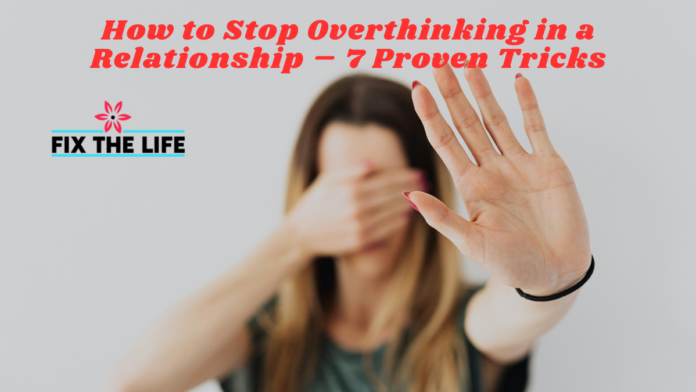Overthinking in relationships can create unnecessary stress, doubts, and emotional exhaustion. While questioning certain aspects of a relationship is normal, constant rumination over small details can lead to relationship anxiety, trust issues, and decreased mental peace. Fortunately, there are effective strategies to break the cycle of overthinking and strengthen emotional security.
Here are seven proven tricks to help you stop overthinking in relationships and embrace emotional balance.
1. Recognize Overthinking Patterns & Their Triggers
The first step to breaking the habit of relationship anxiety is understanding what triggers your overthinking.
Common Overthinking Patterns:
- Analyzing past conversations for hidden meanings.
- Obsessing over whether your partner truly cares.
- Assuming worst-case scenarios instead of trusting reality.
How to Identify Triggers:
- Notice when anxious thoughts take over your emotional state.
- Write down recurring fears—this clarifies irrational worries vs. valid concerns.
- Reflect on whether past experiences shape current insecurities.
Self-awareness reduces emotional overreactions, making it easier to stay present.
2. Stop Seeking Constant Reassurance – Build Self-Trust
Overthinking often leads to constant reassurance-seeking, which can strain relationships. Learning to trust yourself instead of needing external validation helps restore mental peace.
How to Reduce the Need for Reassurance:
- Replace “Do you still love me?” with “I trust that love doesn’t need constant proof.”
- Recognize when doubt is rooted in insecurity rather than reality.
- Remind yourself that healthy relationships thrive on trust, not control.
Building self-trust ensures that your emotions don’t rely solely on external approval.
3. Shift From “What If” Thinking to Present Awareness
The habit of catastrophizing future scenarios fuels relationship anxiety. Focusing on the present instead of worrying about hypothetical outcomes creates emotional stability.
Mindfulness Strategies to Stay Present:
- Grounding exercises: Engage in deep breathing or focus on physical surroundings to break anxious thoughts.
- Challenge negative assumptions: Replace “What if they stop loving me?” with “We are happy today, and that matters most.”
- Practice gratitude: Acknowledge positive moments instead of dwelling on what could go wrong.
The more you anchor yourself in the present, the less your mind spirals into uncertainty.
4. Set Boundaries for Your Thoughts – Interrupt the Cycle
Letting overthinking run unchecked leads to mental exhaustion. Setting boundaries around anxious thoughts helps regain control.
How to Interrupt Overthinking Cycles:
- Limit rumination: Give yourself a set timeframe (e.g., 5 minutes) to process concerns before shifting focus.
- Use distraction techniques: Engage in hobbies, exercise, or social interactions to break repetitive thinking.
- Adopt positive affirmations: Replace “I’m always overanalyzing” with “I allow peace in my thoughts.”
Training your brain to recognize and redirect unhealthy thought loops fosters mental clarity.
5. Strengthen Trust & Communication With Your Partner
Trust issues often amplify overthinking. Open communication creates security, reducing the need for speculation.
Building a Strong Trust Foundation:
- Have honest conversations—clarity reduces the fear of hidden meanings.
- Assume good intentions rather than seeking flaws.
- Acknowledge emotional needs while ensuring independence in thought and feelings.
Healthy relationships thrive when dialogue replaces doubt.
6. Let Go of the Need for Absolute Certainty
Many overthinkers seek perfect certainty before feeling secure, but love doesn’t come with guarantees. Accepting uncertainty allows relationships to evolve naturally.
Ways to Embrace Uncertainty:
- Accept that not every emotion or response needs analysis.
- Replace rigid expectations with flexibility in love.
- Shift from fear-based thinking to enjoying the present connection.
Trusting the process creates peace in relationships, even without full control over outcomes.
7. Cultivate Self-Confidence & Independence
Overthinking often stems from fear of losing connection—strengthening independence ensures emotional balance.
How to Boost Self-Confidence in Relationships:
- Maintain personal hobbies and goals outside of the relationship.
- Focus on self-validation rather than external approval.
- Recognize that your worth isn’t tied to someone else’s reassurance.
A secure self reduces the fear of rejection, allowing relationships to feel lighter and more fulfilling.
Recommendation
10 Signs You’ve Outgrown Your Friends (And What To Do About It)
How to Spot a Love Bomber in the First Week of Dating
7 Things Women Secretly Wish Men Knew About Relationships
Emotional Dumping vs Venting – What’s the Difference?
Couples Therapy Questions You Can Try At Home
FAQs: Common Questions About Overthinking in Relationships
Q1: Why do I overthink even when my partner reassures me?
Overthinking often stems from internal insecurities rather than actual relationship problems. Strengthening self-trust helps reduce the need for constant reassurance.
Q2: Can overthinking ruin a relationship?
Yes, excessive analysis and doubt can create distance, misinterpretations, and unnecessary conflict. Managing thoughts improves emotional connection.
Q3: How can I stop overanalyzing my partner’s words and actions?
Practice mindfulness, positive reframing, and trust-building rather than assuming negative meanings in small interactions.
Q4: Is therapy helpful for overcoming relationship anxiety?
Absolutely! Therapy helps identify thinking patterns, emotional triggers, and strategies to break cycles of overanalysis.
Q5: Can overthinking go away completely?
While overthinking may not disappear entirely, learning to manage and redirect thoughts significantly improves relationship dynamics and mental peace.
Final Thought
Overthinking in relationships can be exhausting, but shifting from fear-based thinking to intentional emotional balance helps create trust, connection, and peace. By practicing self-awareness, present-moment focus, strong communication, and emotional independence, relationships feel lighter, healthier, and more fulfilling.




